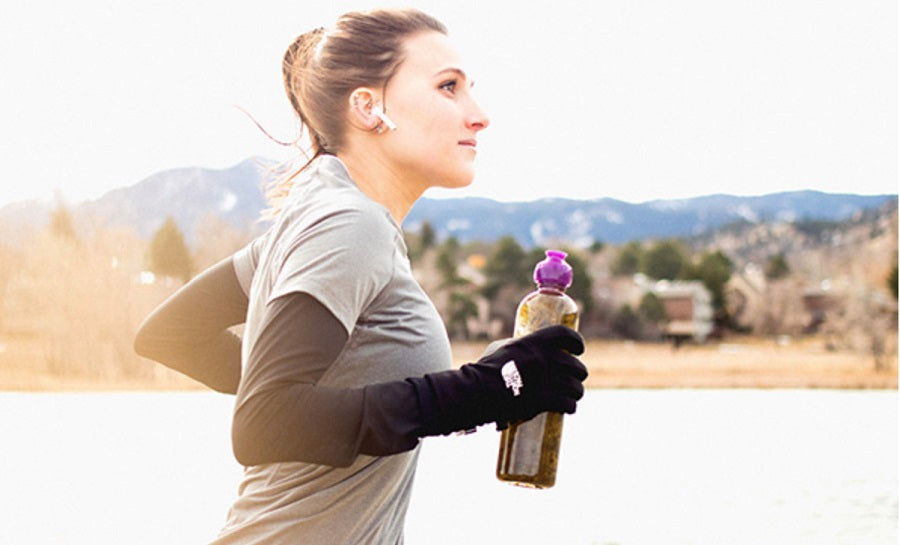by Julie Kailus
“Tea is an ancient beverage, but a new twist aims to bring it to your workout routine.”

“Athlete Maria Uspenski knew she was onto something when she spied Kenyan runners sipping from steaming flasks in Boulder, Colorado’s famous training grounds. She got the gumption to ask what was inside. The endurance athletes confirmed it was tea: always black and always hot, just like they drank it at home.
That made sense.
‘A cold beverage is not a good way to cool down after a workout, because your body expends energy trying to do the opposite – heat up,’ said Uspenski, a cyclist and the founder of premium whole-leaf online tea business The Tea Spot.
Tea: Reaping Natural Benefits
Tea, especially green and white varieties, contains catechins, now touted as anti-cancer agents. But Uspenski is still grasping the untapped value of tea for the fitness community.
As the second most consumed beverage in the world, tea has proven it has a big following and huge benefits, especially the plant-based fuel’s antioxidants.
The problem is that American athletes seem hung up on myths about tea: like only grandmas drink it, or it’s dehydrating. Uspenski can singlehandedly refute every tea myth. Tea is not more dehydrating than water.
Super Hydrating
‘Tea is slightly “super hydrating,” which means there’s actually a little more benefit from consuming tea than the equivalent of water,’ she said. ‘It’s tea’s naturally occurring vitamins and minerals, rather than antioxidants, that make that same-volume beverage hang better in your body.’
But the natural antioxidants in tea are what endurance athletes should seriously consider, especially as an alternative to popular sugar- or additive-laden sports performance supplements. Because plants don’t have immune systems, they produce bitter-tasting polyphenols to ward off contaminants. When athletes drink those plant antioxidant compounds, released during the steeping of tea leaves, they get two boosts.
‘Antioxidants attach themselves to free radicals and help neutralize negative activity in your body. Because we kill our immune capacity through things like pollution and fatty foods, we’re often at a deficiency in these “warrior molecules,”‘ Uspenski says. ‘They also help you metabolize fat better and convert it to energy during endurance activities.’
Studies Supporting Tea for Exercise
Numerous studies have linked tea to improved metabolism, energy expenditure, and oxygen uptake. But active consumers also struggle with understanding which teas are best, how much tea to drink, and ways to take it on the go.
Uspenski, an MIT-trained mechanical engineer, who first branded the term ‘steepware,’ has answers to all those questions. And she’s currently crafting them into a free ebook called ‘Tea Hacks to Boost Your Athletic Performance.’

Below are a few ‘hacks’ to consider.
-
Go for Whole-Leaf Tea
This premium tea type consists of new-growth leaves hand-plucked from the bush. Machine-harvested teas take everything, including stems, chop it into bits, and package it for the grocery-store shelf, where it gets stale and its positive properties wane.‘Generally the more expensive the tea, the more times you can extract, so it just keeps on giving,’ Uspenski says. That means you get several steeps from each scoop or satchel of whole-leaf tea. -
Add Some Citrus
Ascorbic acid, found in orange juice, for example, makes water even more hydrating. So add lemon to tea for greater benefit. Uspenski’s favorite quickie is mixing powerful powdered matcha green tea with lemon for her mountain rides. -
Not Into Hot?
Invest in a steeping travel container that brews and filters your tea ‘cold’ for warm workouts.”To prep cold or ambient-temperature tea at home, run a tap or filtered water over loose leaves in a mason jar. Steep green tea for 10–15 minutes (longer in the fridge for black) to extract the maximum amount of antioxidants. Then, pour it into a water bottle and drink within 48 hours. Try Grasshopper Green, for example, a roasted green tea with peppermint that it’s easy on the stomach.

